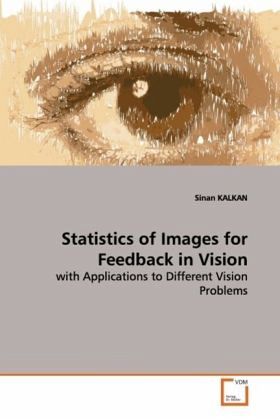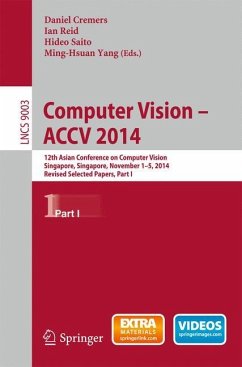
Statistics of Images for Feedback in Vision
with Applications to Different Vision Problems
Versandkostenfrei!
Versandfertig in 6-10 Tagen
39,99 €
inkl. MwSt.

PAYBACK Punkte
20 °P sammeln!
Processing in most artificial or biological visionsystems starts with early vision which involves theextraction of local visual modalities (like opticalflow, disparity and contrast transition etc.) andlocal image structures (edge-like, junction-like andtexture-like structures). Since information in earlyvision is processed only locally, it is inherentlyambiguous. One way to deal with the missing andambiguous information is to make use of theredundancy of visual information by exploiting thestatistical regularities of natural scenes. This bookis interested in the ambiguities and the biased andm...
Processing in most artificial or biological vision
systems starts with early vision which involves the
extraction of local visual modalities (like optical
flow, disparity and contrast transition etc.) and
local image structures (edge-like, junction-like and
texture-like structures). Since information in early
vision is processed only locally, it is inherently
ambiguous. One way to deal with the missing and
ambiguous information is to make use of the
redundancy of visual information by exploiting the
statistical regularities of natural scenes. This book
is interested in the ambiguities and the biased and
missing information in the processing of optic flow,
stereo and junctions using statistical means. It uses
statistical properties of images to analyze the
extent of the ambiguous processing in optical flow
estimation and whether the missing information in
stereo can be recovered using interpolation of depth
information at edge-like structures. Moreover, it
proposes a feedback mechanism for dealing with the
bias in junction detection, and another model for
recovering the missing depth information in stereo
computation using only the depth information at the
edges.
systems starts with early vision which involves the
extraction of local visual modalities (like optical
flow, disparity and contrast transition etc.) and
local image structures (edge-like, junction-like and
texture-like structures). Since information in early
vision is processed only locally, it is inherently
ambiguous. One way to deal with the missing and
ambiguous information is to make use of the
redundancy of visual information by exploiting the
statistical regularities of natural scenes. This book
is interested in the ambiguities and the biased and
missing information in the processing of optic flow,
stereo and junctions using statistical means. It uses
statistical properties of images to analyze the
extent of the ambiguous processing in optical flow
estimation and whether the missing information in
stereo can be recovered using interpolation of depth
information at edge-like structures. Moreover, it
proposes a feedback mechanism for dealing with the
bias in junction detection, and another model for
recovering the missing depth information in stereo
computation using only the depth information at the
edges.












